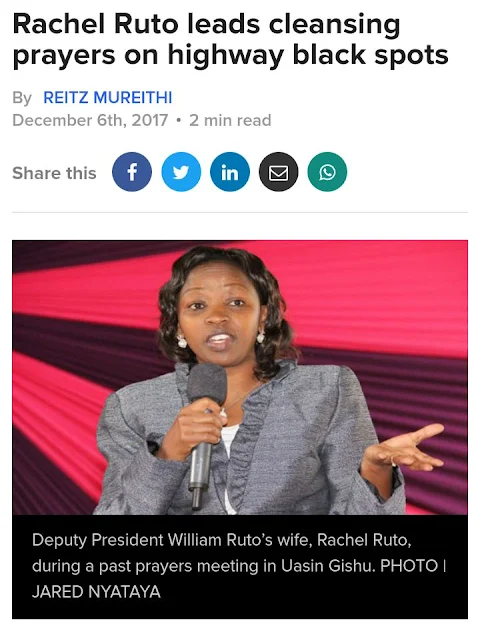Featured
- Get link
- X
- Other Apps
Kenya's Healthcare Crisis: Striking Doctors Turn to Prayer Amid Shocking Government Failures
In a striking twist of irony, striking doctors and nurses in Uasin Gishu County, the home county of President William Ruto, have resorted to prayer as their plight worsens amidst the government's failures.
The move comes after the first lady's penchant for prayer and a recent visit from preacher Benny Hinn, sponsored by public funds, aimed at resolving the country's myriad challenges—a mess largely attributed to Ruto's government.
Pastor Dorcas Rigathi gathers preachers to pray for an end to doctors strike https://t.co/C3T7IbM84B
— Capital FM Kenya (@CapitalFMKenya) April 6, 2024
Mockingly responding to Pastor Dorcas Rigathi, wife of Deputy President Rigathi Gachagua, who vowed to pray for an end to the doctors' strike, the medical professionals in Eldoret decided to take matters into their own hands, highlighting the government's hypocrisy and ineffective leadership.
Kenyan citizens have rallied behind the striking doctors, who are protesting the government's refusal to honour the 2017 Collective Bargaining Agreement (CBA) and instead instituting drastic cuts to intern doctors' pay—from 260,000 shillings to a mere 70,000 shillings. President Ruto's claim of a lack of funds to pay doctors is met with scepticism, given the government's excessive spending on non-essential items while essential services suffer.
NEWS JUST IN: The Kenya National Commission on Human Rights (KNCHR), the Gov't agency responsible for safeguarding human rights and basic freedoms, have also decided they're tired of massaging the donkey down the slope anymore. Even in Gov't, they'll be there no matter what. pic.twitter.com/4kOqAoohLt
— Gabriel Oguda (@gabrieloguda) April 15, 2024
Striking doctors and nurses in Uasin Gishu have sardonically decided to pick up from where the First Lady left off, a development that reflects the growing frustration with the government's reliance on religious propaganda to deflect responsibility for its failures. As the healthcare system teeters on the brink of collapse, the efficacy of prayer in resolving systemic issues is put to the test.
Calls for accountability grow louder, with demands for legal action against the government for any lives lost during the strike. The hypocrisy of the first and second families, using religion to mask their incompetence, is laid bare as the country grapples with a healthcare crisis exacerbated by their mismanagement.
As the nation awaits the outcome of the doctors' prayers, one thing is clear: the government's empty promises and religious theatrics cannot substitute for effective governance and genuine solutions to the country's pressing challenges. The true test of leadership lies not in prayers, but in concrete actions to address the needs of the people and ensure their well-being.
Popular Posts

Who’s Nailin’ Paylin?
- Get link
- X
- Other Apps

A selection of Kenyan women
- Get link
- X
- Other Apps


.jpeg)

Comments